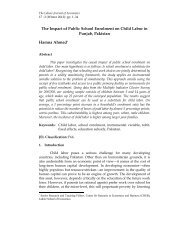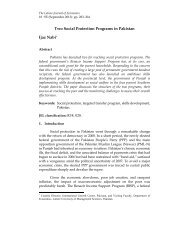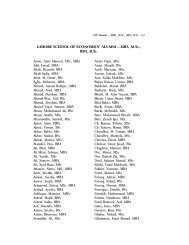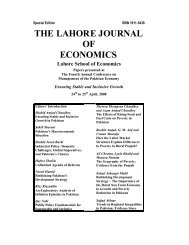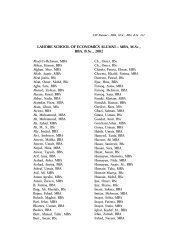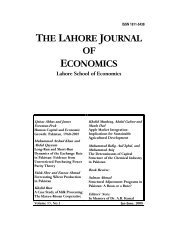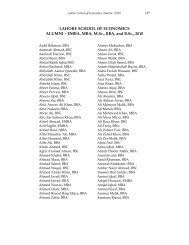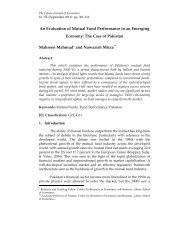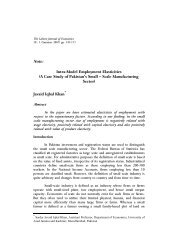Special Edition-07.pdf - Lahore School of Economics
Special Edition-07.pdf - Lahore School of Economics
Special Edition-07.pdf - Lahore School of Economics
Create successful ePaper yourself
Turn your PDF publications into a flip-book with our unique Google optimized e-Paper software.
190<br />
Samina Shabir and Reema Kazmi<br />
Presently Pakistani markets are heavily flooded with cheap Chinese<br />
smuggled goods – a major part <strong>of</strong> the illegal trade in the country. A legal<br />
channel for the trade <strong>of</strong> these commodities, even in the absence <strong>of</strong> an FTA,<br />
can make Pakistan’s trade volume double with China. Since smuggling<br />
normally takes place to save on custom duties/tariffs, the implementation <strong>of</strong><br />
the FTA makes such activities useless or non-pr<strong>of</strong>itable since tariffs/duties<br />
saved by the smugglers have largely been removed under the FTA. Legal<br />
documentation <strong>of</strong> these commodities will have a positive impact on<br />
Pakistan’s economy. Although the goods being shipped from China to<br />
Pakistan and vice versa will be duty free, they will still be registered thus<br />
enabling the government to collect revenue in the form <strong>of</strong> income/sales tax<br />
on them. As we see an influx <strong>of</strong> cheap Chinese products enter Pakistan<br />
under the FTA, this can be good for Pakistan’s economy in the sense that<br />
documentation leading to subsequent tax generation will increase CBR<br />
collection for the country.<br />
Besides the aforementioned products, there are other specific<br />
products in which China is more competitive than Pakistan. The<br />
procurement <strong>of</strong> many <strong>of</strong> these products is vital for the Pakistani economy<br />
as well e.g., textile, cotton yarn and garments represent a major share <strong>of</strong><br />
Pakistan’s total exports. Opening the Chinese economy to these sectors<br />
would obviously mean a replacement <strong>of</strong> domestic production by cheap<br />
imports from China. Since Pakistan is in the initial stages <strong>of</strong> development,<br />
it is trying to expand its industrial base through the expansion in its<br />
production <strong>of</strong> semi-finished and finished products. Therefore,<br />
strengthening its engineering sector, auto sub-sector, consumer durables<br />
mainly domestic appliances needs at least at this point in time some<br />
protection in order for the booming trend in the economy to be<br />
sustained.<br />
One <strong>of</strong> the most frequent and recurrent concerns regarding any<br />
FTA is that the impending FTA, allowing for an influx <strong>of</strong> various goods,<br />
might stifle the indigenous industry <strong>of</strong> the less developed country or the<br />
country having a smaller economy. In the case <strong>of</strong> Pakistan – China FTA<br />
similar reservations have been expressed by various strata <strong>of</strong> the society<br />
especially industrialists, small business operators as well as academia <strong>of</strong> the<br />
country. Pakistan being a smaller economy as compared to China is<br />
compelled to look out for its local industries. Since the removal <strong>of</strong> duty<br />
on almost 90% <strong>of</strong> tradable products between the two countries could have<br />
spelt disaster for the textiles, garments, and engineering industries, which<br />
although booming at present are still in their infancy and thus are in not<br />
a position to face a deluge <strong>of</strong> cheap Chinese goods. Realizing the dangers<br />
associated with the implementation <strong>of</strong> an FTA, both the countries have



